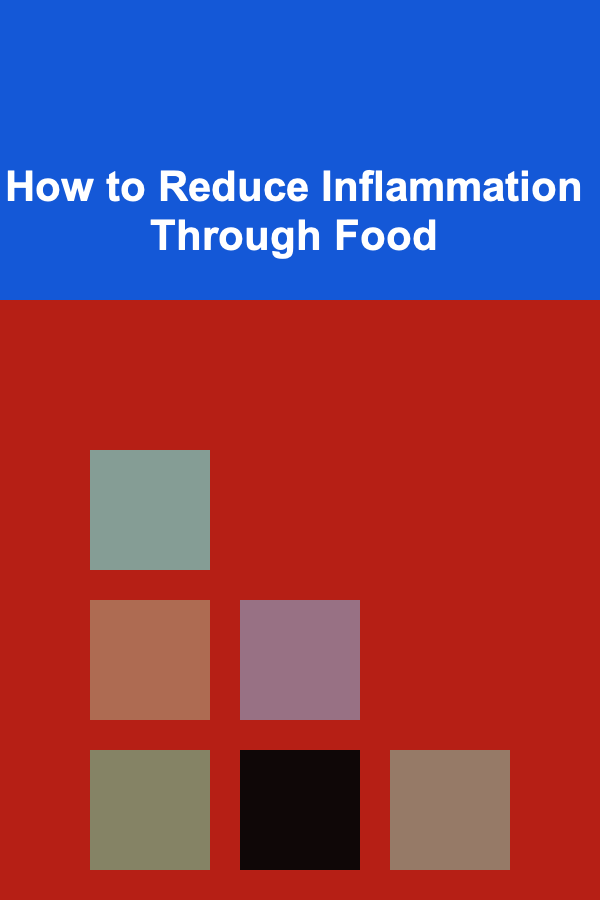
How to Reduce Inflammation Through Food
ebook include PDF & Audio bundle (Micro Guide)
$12.99$8.99
Limited Time Offer! Order within the next:

Inflammation is a natural and essential response by the body's immune system to injury, infection, or harmful stimuli. However, when inflammation becomes chronic, it can contribute to a variety of health conditions, including heart disease, diabetes, arthritis, and autoimmune disorders. Chronic inflammation is linked to the body's inability to effectively turn off the inflammatory response, leading to persistent damage to tissues and organs.
One of the most effective ways to reduce chronic inflammation is through dietary choices. The foods we eat can either promote or reduce inflammation, depending on their nutritional content. A diet rich in anti-inflammatory foods can help regulate the immune system and reduce the risk of developing chronic diseases.
This article delves deep into how to reduce inflammation through food, providing insights into the types of foods that can help manage inflammation and how to incorporate them into your daily diet.
Understanding Inflammation
Before we explore how food can reduce inflammation, it's important to understand what inflammation is and why it occurs.
Acute vs. Chronic Inflammation
- Acute Inflammation: This is the body's immediate response to an injury or infection. It typically involves symptoms like redness, heat, swelling, and pain. Acute inflammation is necessary for healing, as it helps fight off infections and repair damaged tissue. This type of inflammation is short-term and usually resolves once the body has healed.
- Chronic Inflammation: When the immune system continues to send inflammatory signals even after the injury or infection has healed, it results in chronic inflammation. This prolonged inflammation can contribute to various health issues, such as cardiovascular diseases, metabolic syndrome, cancer, and autoimmune conditions. Chronic inflammation often occurs due to lifestyle factors, including poor diet, stress, lack of sleep, and environmental toxins.
The Role of Inflammatory Markers
The immune system produces various chemicals in response to inflammation, such as cytokines, interleukins, and C-reactive protein (CRP). These markers indicate the presence of inflammation in the body. Elevated levels of CRP, for example, are linked to an increased risk of heart disease, while elevated cytokines have been associated with autoimmune diseases like rheumatoid arthritis and inflammatory bowel disease.
The Link Between Diet and Inflammation
Diet plays a significant role in either promoting or reducing inflammation. Certain foods contain compounds that have anti-inflammatory effects, while others can trigger or worsen inflammation in the body. By making mindful choices, it is possible to lower inflammation and its associated risks.
Foods That Promote Inflammation
Some foods, particularly those rich in processed ingredients, unhealthy fats, and sugars, can contribute to inflammation. These foods include:
- Refined Carbohydrates: White bread, pastries, and other refined grain products can cause a rapid spike in blood sugar levels, leading to an inflammatory response.
- Fried Foods: Fried foods are often cooked in oils that contain trans fats, which have been shown to increase inflammation in the body.
- Sugary Beverages: Sodas, sweetened fruit drinks, and other sugary beverages can promote inflammation due to their high sugar content.
- Processed Meats: Bacon, sausages, and other processed meats contain high levels of advanced glycation end products (AGEs), which can promote inflammation.
- Excessive Alcohol: Drinking large amounts of alcohol can lead to an inflammatory response, affecting the liver and gut health.
In contrast, there are foods that can help combat this inflammatory response and promote overall health.
Anti-Inflammatory Foods
Certain foods are packed with nutrients and compounds that help reduce inflammation. These foods include a variety of fruits, vegetables, healthy fats, and other nutrient-dense options that have been shown to regulate the inflammatory process in the body.
1. Fatty Fish (Omega-3 Fatty Acids)
Fatty fish, such as salmon, mackerel, sardines, and tuna, are excellent sources of omega-3 fatty acids. Omega-3s are known to have powerful anti-inflammatory properties by reducing the production of pro-inflammatory cytokines.
How Omega-3 Fatty Acids Work
Omega-3 fatty acids influence the immune system and reduce the production of inflammatory molecules like prostaglandins and leukotrienes. They also help lower the levels of CRP in the bloodstream, a key marker of inflammation. Regular consumption of omega-3-rich fish is associated with a reduced risk of chronic inflammatory diseases, including heart disease and arthritis.
2. Leafy Greens and Vegetables
Leafy greens like spinach, kale, and swiss chard are rich in antioxidants, vitamins, and minerals that can reduce inflammation. Vegetables like broccoli, Brussels sprouts, and cauliflower also contain compounds that can help decrease inflammatory markers in the body.
The Role of Antioxidants
Antioxidants like vitamins A, C, and E neutralize free radicals in the body, which are unstable molecules that can damage cells and promote inflammation. By incorporating a variety of colorful vegetables into your diet, you can help reduce oxidative stress and inflammation.
3. Fruits (Berries, Cherries, and Citrus Fruits)
Fruits are excellent sources of vitamins, minerals, and antioxidants that help fight inflammation. Berries, such as strawberries, blueberries, and raspberries, are particularly potent because they contain anthocyanins, powerful antioxidants that can lower inflammation.
The Power of Polyphenols
Many fruits, especially berries, citrus fruits, and cherries, are rich in polyphenols---plant compounds that have been shown to reduce inflammation. Polyphenols inhibit the production of inflammatory enzymes and reduce oxidative stress, which helps protect the body from chronic inflammation.
4. Olive Oil (Monounsaturated Fats)
Olive oil, particularly extra virgin olive oil, is a staple in the Mediterranean diet and is known for its anti-inflammatory effects. Olive oil contains oleocanthal, a compound that inhibits the activity of enzymes involved in inflammation, similar to the way ibuprofen works.
How Olive Oil Helps
The monounsaturated fats in olive oil not only reduce inflammation but also promote heart health by improving cholesterol levels and reducing the risk of cardiovascular disease. Regular consumption of olive oil has been linked to a lower risk of chronic diseases and improved immune function.
5. Nuts and Seeds
Nuts like almonds, walnuts, and seeds such as chia seeds and flaxseeds are excellent sources of healthy fats, fiber, and antioxidants that help reduce inflammation. Walnuts, in particular, are high in omega-3 fatty acids, while flaxseeds and chia seeds provide both omega-3s and fiber.
Omega-3s and Fiber for Reduced Inflammation
The healthy fats and fiber found in nuts and seeds help reduce inflammatory markers, regulate blood sugar levels, and support heart health. Including a small handful of nuts or seeds in your diet daily can provide significant anti-inflammatory benefits.
6. Turmeric (Curcumin)
Turmeric, a yellow spice commonly used in Indian cuisine, contains an active compound called curcumin, which has potent anti-inflammatory properties. Curcumin has been shown to reduce levels of inflammatory markers like CRP and cytokines.
How Curcumin Works
Curcumin works by blocking the activation of several molecular pathways involved in inflammation. It can reduce oxidative stress, support joint health, and alleviate symptoms of conditions like arthritis and inflammatory bowel disease. To enhance curcumin absorption, it's recommended to pair turmeric with black pepper, which contains piperine, a compound that improves the bioavailability of curcumin.
7. Green Tea
Green tea contains polyphenols, particularly epigallocatechin gallate (EGCG), which have been shown to reduce inflammation. Drinking green tea regularly can help lower levels of CRP and other inflammatory markers in the body.
The Anti-Inflammatory Power of EGCG
EGCG works by inhibiting the activity of pro-inflammatory enzymes and reducing the production of inflammatory cytokines. It also has antioxidant properties that help reduce oxidative stress and protect cells from damage.
8. Garlic and Onions
Garlic and onions are rich in sulfur-containing compounds, such as allicin and quercetin, which have anti-inflammatory and antioxidant effects. These compounds help regulate the immune system, reduce oxidative stress, and lower inflammation.
The Role of Sulfur Compounds
The sulfur compounds in garlic and onions help reduce inflammation by inhibiting the production of pro-inflammatory molecules. Regular consumption of garlic and onions can help prevent and manage conditions like cardiovascular disease, diabetes, and cancer.
Incorporating Anti-Inflammatory Foods into Your Diet
Incorporating anti-inflammatory foods into your diet doesn't have to be difficult or restrictive. Here are some tips on how to make anti-inflammatory foods a regular part of your meals:
- Start Your Day with a Healthy Breakfast: Incorporate fruits, nuts, and seeds into your breakfast. A smoothie with berries, flaxseeds, and spinach, or oatmeal with walnuts and chia seeds, can be a great way to start the day.
- Choose Whole Grains: Opt for whole grains like quinoa, brown rice, and oats instead of refined grains. These provide fiber and nutrients that help reduce inflammation.
- Use Olive Oil for Cooking: Replace vegetable oils and butter with extra virgin olive oil. Use it for sautéing vegetables, drizzling on salads, or making homemade dressings.
- Snack on Anti-Inflammatory Foods: Nuts, seeds, and berries make great snacks that are both satisfying and anti-inflammatory.
- Drink Green Tea: Replace sugary beverages with green tea or flavored water with lemon, cucumber, or mint.
Conclusion
Chronic inflammation is a major risk factor for a wide range of health conditions, but it can be mitigated through thoughtful dietary choices. By incorporating a variety of anti-inflammatory foods, such as fatty fish, leafy greens, fruits, nuts, olive oil, turmeric, and green tea, you can help regulate inflammation and promote overall health. A well-balanced diet rich in antioxidants, healthy fats, and anti-inflammatory compounds is key to managing inflammation and reducing the risk of chronic diseases.

How to Create a Checklist for Building Healthy Relationships
Read More
How to Create a Checklist for Gathering Data from Online Sources
Read More
How to Create a Documentation Checklist for Software Implementation
Read More
How to Create a Pet Care Schedule for Busy Households
Read More
How to Create a Vintage Lighting Look Without Spending a Fortune
Read More
The Art of Selling: A Sales Executive's Blueprint for Success
Read MoreOther Products

How to Create a Checklist for Building Healthy Relationships
Read More
How to Create a Checklist for Gathering Data from Online Sources
Read More
How to Create a Documentation Checklist for Software Implementation
Read More
How to Create a Pet Care Schedule for Busy Households
Read More
How to Create a Vintage Lighting Look Without Spending a Fortune
Read More